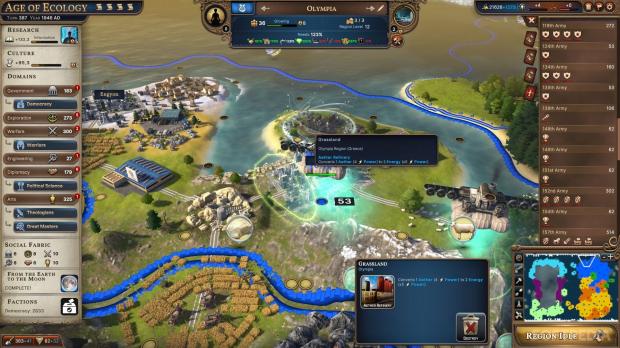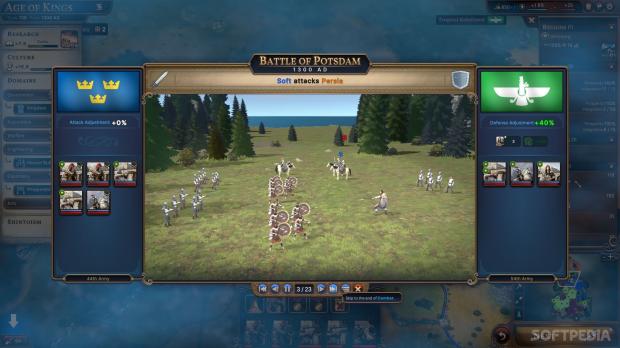The big problem with Aether-powered improvements is that they use Specialists, which aren’t really plentiful. I really need that extra power to get some big city boosts, with a focus on those that can boost research output and education levels. I decide to only upgrade or space Specialist-powered improvements in one region, the big one in the middle of my nation where I have room and workers to spare.
My cultural power will activate in two turns, so I need to start thinking about how to use it. I will probably create another town in one of my more advanced regions, but it might also be worth it to call for an instantaneous truce, forcing rivals Germany and Brazil to stop fighting me. This will mean precious resources can be re-directed to development instead of creating more landships.
In the meantime, I plan to use some military points to reinforce my armies and some art to spawn another artist and then get him to master status. This will allow me to complete the Great Masters tradition and then improve my nation’s social fabric. I might also invest government power into another settler, although there’s precious little free space left in this world to place a vassal that can thrive.
Millennia is developed by C Prompt Games and published by Paradox Interactive. I played the PC version on Steam. The title uses a classic turn-based strategy structure with some interesting alternate reality elements.



This is a strategy game inspired by real-world history but willing to deviate from it in interesting ways. Players will control nations like Japan, France, or Greece, but they are little more than a small bonus and a style. All start off with a city in their capital region and a few units and aim to dominate the world.
Players will create their own stories while navigating through history. Millennia puts a unique spin on progression, featuring a host of alternate ages that are activated based on gamer behavior and choices. It takes some effort to access the ones centered on positive achievements and it’s pretty easy to slide in the dangerous ages. The game’s writing, for everything from tech to buildings to units, is mostly utilitarian. The encyclopedia is extensive and does a good job of explaining concepts.
Millennia’s gameplay is familiar. Players move their units on the map, create new buildings in their cities, place improvements on tiles to harvest and process resources, conduct research, and interact diplomatically with other powers. So far, so classic 4X with a turn-based structure.
As time progresses, players unlock domains, ranging from government to arts, each with associated powers. You do not train a settler in Millennia, instead, you use Government experience to activate one. And he does not create a full city but a vassal, which in time can be integrated by spending more XP (costs for both actions increase after each use). Basically, players need to be more careful when it comes to both expansion and development.
There are no pioneers or workers. Players get a pool of improvement points (later joined by specialists) to place buildings on the map, starting with plantations and quarries and evolving to solar plants, public schools, and secret laboratories. All of these require manpower from cities and generate various types of goods (they can be traded between regions and with other factions).
Ages are the big strategic level innovation in Millennia. Players need to research several techs to push for the next (rushing is encouraged and the minimum number evolves) and, depending on player actions, they might end up in alternate historical situations. Variants introduce new research and building options, Crisis ages come complete with a disaster but players who carefully plot their course can also aim for an early Victory age.
At certain Age milestones, players also adopt a National Spirit to shape their faction. They are designed to encourage different strategic approaches and require a serious investment of points associated with a domain to reveal all their bonuses. Choose wisely but do not be afraid to experiment.
It’s possible to play with a normal historical progression, avoiding surprises while trying to win by launching a colony ship or reaching tech singularity. But it’s much more fun to aim for variant ages, choosing which techs to put on the backburner and how to work around the limitations that will create for a nation.
Computer-powered countries make for capable rivals, aggressive military, and decent when it comes to developing their own cities. They tend to fall behind once players push to an age where they can get a clear advantage and don’t do well in the face of a crisis. The rudimentary diplomacy system means it’s hard to create complex relationships between factions.
Millennia also features multiplayer, for strategy fans who want to test their skills against friends. Stick to the medium maps and six or seven civilizations because, with a lot of cities, units, and improvements, the late game tends to run slowly even on a capable computer.
Millennia looks decent but stays close, when it comes to presentation, to the genre’s heavy hitters. Players can zoom in to take a closer look at their units and cities, but they’ll mostly spend their time zoomed out, checking out strategic situations and thinking how to react to big enemy moves. The interface isn’t perfectly organized, grouping most player actions in the top left, except improvements, which can escape the player’s attention on the lower left. The battle animations are pretty silly, so skip them all.
The game’s soundtrack is good, with enough orchestral heights and variety to accompany its campaigns. I actually didn’t feel the need to replace them with history-focused podcasts. Combat sounds are repetitive and will become annoying. The rest of the sound landscape is decent, giving players hints about what’s happening around them.



The Good
- Alternate history Ages
- Vassal system
- National Spirit variety
The Bad
- Separate battle screen
- Limited diplomacy
- Some interface-related decisions
Conclusion
The combat sequences need to go and the title should expand its diplomatic elements and trade system. The development team is planning to add modding support before the end of the year. Millennia isn’t a revolution for the 4X genre but has good ideas, even if they aren’t always matched by the execution.
Review key provided by the publisher.
 14 DAY TRIAL //
14 DAY TRIAL // 























